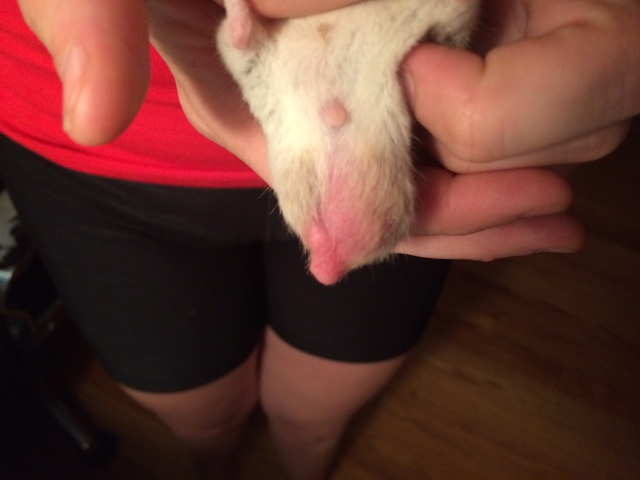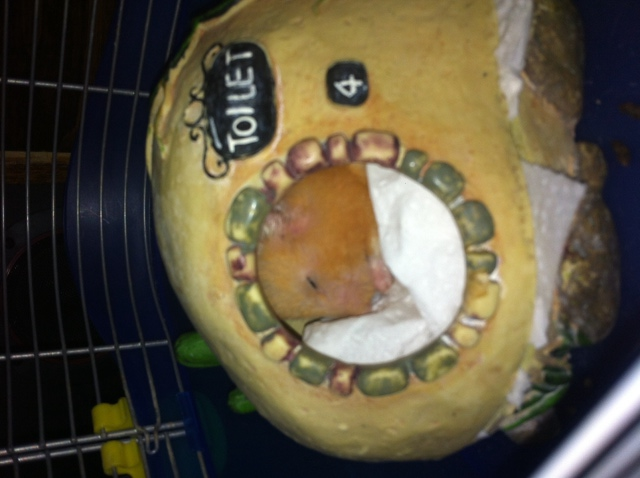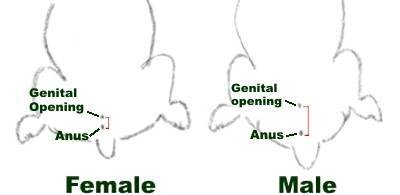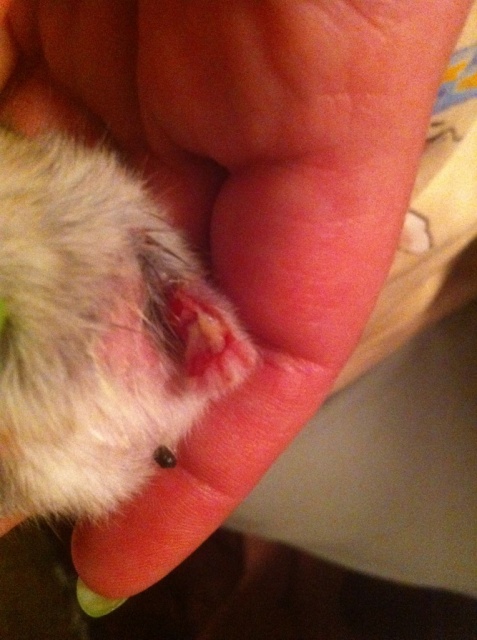QuestionOur hamster all of the sudden woke up one morning with his eyes basically glued shut with mucus and very disoriented spinning in circles and falling over constantly. I have cleared his eyes and the eye problem is no longer an issue but the is still very disoriented and unstable he has also lost a significant amount of weight but since clearing his eyes he has gotten a little (very little) better and is now moving around his cage again instead of staying in the corner not eating or drinking. He has started eating and drinking again but is still extremely uncoordinated. What could be wrong and do you think he will be ok or should I start preparing my son for the worst? Please help!!! Thank you! Freddy Lopez
AnswerHi Freddy,
This could be a number of things so lets go through the possibilities. One - a cold:
hamsters can catch colds from humans so its vital that you keep contact with your pet to minimum if you have a cold. The symptoms are lethargy, refusal to eat or drink, weight loss, runny nose and eyes, and labored or wheezy breathing. However, uncoordination isn't usually a sign of a cold, but just in case, the best treatment for this is to put him in a warmer room (not hot), with some extra bedding. he should recover in a couple of days.
eye problems:
Occasionally a hamster may get a sticky eye where the eyelids are fused together and older hamsters may be prone to 'sticky eyes'. This is often because a hamster may have something it its eye such as a piece of dust or it could be because the hamster's cage is placed in a draught or could be a symptom of a cold or allergy. The closed eye should be wiped with a small piece of cotton wool soaked in luke warm water. This is usually sufficient to open the eye but if not the eyelids can gently be pulled apart.
If a hamster has recurring problems with runny or sticky eyes or the eye appears cloudy the hamster could have an eye infection. This can be treated by mixing half a cup of sterile (boiled and cooled) water with a teaspoon of boric acid powder (available from a chemist or pharmacy) and using an eye dropper to bathe the eye twice or three times a day. If the hamster does not show improvement within a couple of days veterinary advice should be sought as antibiotics may help.
a stroke:
Hamsters can suffer from strokes and these most often occur overnight when the hamster is active. The hamster may appear uncoordinated with semi-paralysis on one side of the body resulting in a head tilt and inability to walk straight. The hamster may also fall over repeatedly or be unable to sit up.
Many hamsters do recover well from strokes but it is essential in the early days following a stroke that the hamster continues to eat and drink and depending on the severity of the stroke it may be necessary to hand feed the hamster and take it to the water bottle to enable it to drink, or place the hamster in the nest with some food and move the water bottle close to the nest.
Hamsters that have suffered strokes usually show some improvement within a couple of days and will continue to improve over the next few weeks, regaining their mobility and co-ordination. However, some head tilt may remain.
allergy:
A hamster may become allergic to certain foods and too much high energy 'heating' foods such as oats, corn and maize in the diet can cause skin irritation with the hamster scratching excessively. Bedding material, cage cleaner, dust, etc can also cause allergic reactions in some hamsters. The symptoms of an allergy can vary but may include sneezing, wheezing, skin irritation, runny eyes, fur loss. Allergy to a cage cleaner or wood shavings can result in irritated stomach and feet.
If an allergy is suspected it is necessary to establish the cause of the allergy. The first thing to consider is whether anything has changed in your hamster's routine which could be the cause of the allergy - has something new been bought for the hamster, has the food or bedding been changed, something added to the room in which the hamster is kept, etc? Wood shavings and bedding can be replaced with tissue paper to establish if the bedding material is the cause of the allergy, feeding a plain diet or dog biscuits only for a few days may establish if the hamster is suffering from a food allergy and moving the hamster to a different room may help to establish if it is something in it's environment which is the cause of the allergy.
Once the source of the allergy has been found this should be removed and the hamster should recover fairly quickly.
in the allergy section see irritated feet, this could be causing his funny walking.
I hope some of these answers have helped - if you still cannot resolve the matter yourself, please see a vet.
Best of luck to you and your little hamster. Thank you for your question.
Joanne xx
(some answers taken from www.petwebsite.com)

 Male Chinese Dwarf Hamster - Retracted testicle??
Question
Testicle
Hi Sheila!
I have a question.
Male Chinese Dwarf Hamster - Retracted testicle??
Question
Testicle
Hi Sheila!
I have a question.
 Winter White Hamster Bald spot
Question
Bald spot Flash Bald Spot No Flash
Winter White Hamster Bald spot
Question
Bald spot Flash Bald Spot No Flash
 My Hamster hasnt peed in 2-3 days!!! HELP...
Question
My Lil Bit
I have a female Syrian hamst
My Hamster hasnt peed in 2-3 days!!! HELP...
Question
My Lil Bit
I have a female Syrian hamst
 Babies!!! And more babies!!!
QuestionI bought 2 hamsters for my daughter and apparen
Babies!!! And more babies!!!
QuestionI bought 2 hamsters for my daughter and apparen
 Hamster chewing foot
Question
his foot
Hi, I got my daughter a Dwarf Russia
Hamster chewing foot
Question
his foot
Hi, I got my daughter a Dwarf Russia